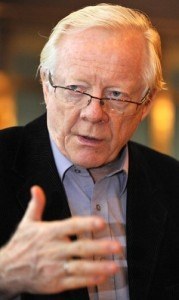 Goran Therborn in the New Left Review:
Goran Therborn in the New Left Review:
The world has been getting contradictory messages about its class structure. According to one authoritative account, it has reached a ‘global tipping point’—‘half the world is now middle class or wealthier’. This was based on figures marshalled by Homi Kharas, a former World Bank chief economist now at Brookings. More excitably, the Economist has hailed the ‘relentless rise’ of a ‘burgeoning bourgeoisie’ and trumpeted the arrival of a middle-class world. Yet serious scholarship also assures us of the opposite: according to Peter Temin, emeritus professor of economics at mit, we should be concerned about ‘the vanishing middle class’. Readers could be forgiven for feeling bewildered. What is going on in economics—and in the economic sociology of the real world? This contribution will examine the varying definitions of ‘middle class’ in play and the contrasting trajectories analysed by development economists, sociologists and financial journalists across the different sectors of the world economy. It will go on to outline a rather different future for the world’s middle classes than either of the extremes suggested here. But first, a few historical and conceptual considerations may be in order, for the concept of the ‘middle class’ has long given rise to debate.
The term ‘middle class’ entered the English language two centuries ago—‘sometime between 1790 and 1830’, according to Eric Hobsbawm—as a rising industrial society overtook the ‘military’ order of monarchy and aristocracy. The nineteenth century saw intensive discussion over where this new society was headed and the place of the middle class within it. The liberal argument was that the task of government should, and would, fall to the middle class, ‘the most wise and the most virtuous part of the community’, as James Mill put it. Had this already been accomplished? For Tocqueville, writing in 1855, the reign of the middle class had been realized not only in the United States but also in France, where the July Revolution of 1830 marked its ‘definitive’ and ‘complete’ triumph. Would the emergent middle-class society lead on to a new and stable political order? In the later decades of the nineteenth century, this was increasingly questioned. Novel ‘isms’ appeared: mobilizing ideas, first and foremost socialism, which theorized ‘middle-class society’ as capitalism, doomed to be overthrown by the expanded ranks of the industrial working class.
More here.
